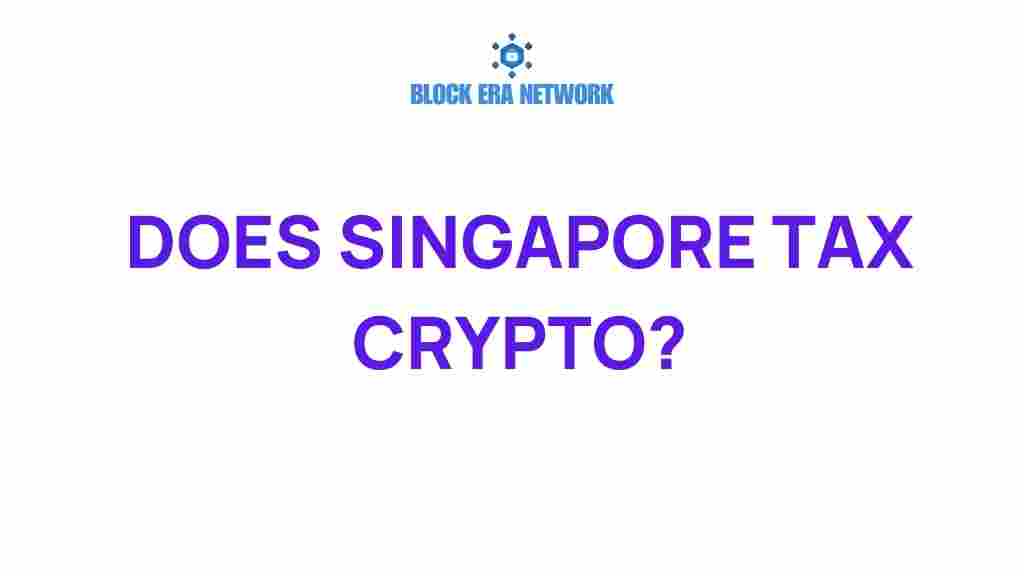Does Singapore Tax Crypto? Unraveling the Financial Landscape
As cryptocurrency continues to gain traction as a popular investment vehicle, understanding the tax implications in various jurisdictions becomes essential for investors and users alike. In this article, we will explore the current state of Singapore crypto tax, the regulations surrounding cryptocurrency, and how these factors influence the overall financial landscape in Singapore. We will also discuss compliance measures, potential economic impacts, and provide insights for investors navigating this evolving environment.
Understanding the Basics of Cryptocurrency and Taxation in Singapore
Initially, it’s crucial to define what cryptocurrency is. Cryptocurrency is a digital asset that uses cryptography for security and operates on decentralized technology known as blockchain. As cryptocurrencies like Bitcoin, Ethereum, and others have surged in popularity, questions regarding taxation have become increasingly relevant.
In Singapore, the approach to crypto tax is relatively progressive compared to many other countries. The Monetary Authority of Singapore (MAS) and the Inland Revenue Authority of Singapore (IRAS) have established clear guidelines on how cryptocurrency is treated for tax purposes. Understanding these guidelines is vital for compliance and effective financial planning.
Taxation of Cryptocurrency in Singapore
In Singapore, cryptocurrency is not considered legal tender but is classified as a digital payment token. This classification influences how it is taxed. Here are the key points regarding the taxation of cryptocurrency:
- Goods and Services Tax (GST): As of January 1, 2020, the sale and exchange of digital payment tokens, including cryptocurrencies, are exempt from GST. This means that transactions involving crypto are not subject to this tax.
- Income Tax: If you earn cryptocurrency as income (for example, through mining or as a salary), this is subject to income tax. The fair market value of the cryptocurrency at the time of receipt will be considered your taxable income.
- Capital Gains Tax: Singapore does not have a capital gains tax. Therefore, if you buy and sell cryptocurrencies for profit, those gains are not taxed, provided you are not trading as a business.
Investment and Compliance in the Crypto Landscape
Investing in cryptocurrency in Singapore requires a clear understanding of the compliance landscape. Here are the compliance measures to consider:
- Know Your Customer (KYC): Cryptocurrency exchanges operating in Singapore are required to implement KYC procedures to verify the identity of their users.
- Anti-Money Laundering (AML): Exchanges must comply with AML regulations, which aim to prevent the use of cryptocurrencies for illicit activities.
- Licensing Requirements: Under the Payment Services Act (PSA), cryptocurrency exchanges must obtain a license from the MAS to operate legally.
For investors, compliance is essential not only for legal reasons but also to ensure the safety and security of their investments. By investing in regulated platforms, investors can reduce risks associated with fraud and mismanagement.
Economic Impact of Crypto Regulations in Singapore
The regulatory framework surrounding cryptocurrency in Singapore has significant economic implications. By fostering a favorable environment for crypto businesses, Singapore positions itself as a global hub for blockchain and cryptocurrency innovation. Here are some key impacts:
- Attracting Investment: The clear regulatory guidelines have attracted both local and international investors seeking to invest in crypto projects and startups.
- Job Creation: As more crypto businesses establish themselves in Singapore, the demand for skilled professionals in the blockchain and fintech sectors grows, leading to job creation.
- Economic Diversification: By embracing cryptocurrency and blockchain, Singapore diversifies its economy and reduces reliance on traditional sectors.
Step-by-Step Guide to Managing Crypto Investments and Tax Compliance
For investors looking to navigate the Singapore crypto landscape effectively, here is a step-by-step guide:
- Educate Yourself: Understand the basics of cryptocurrency, blockchain technology, and the specific regulations in Singapore.
- Choose a Regulated Exchange: Select a cryptocurrency exchange that complies with Singapore’s regulations and has proper KYC and AML measures in place.
- Maintain Accurate Records: Keep detailed records of all your cryptocurrency transactions, including purchase dates, amounts, and values, to ensure accurate tax reporting.
- Consult a Tax Professional: Engage a tax advisor familiar with cryptocurrency regulations in Singapore to assist with your tax compliance and planning.
- Stay Updated: Cryptocurrency regulations are continually evolving. Stay informed about changes in the legal landscape and adapt your strategies accordingly.
Troubleshooting Common Issues in Crypto Tax Compliance
Investors may encounter various challenges when dealing with cryptocurrency taxation. Here are some common issues and troubleshooting tips:
- Issue: Difficulty tracking transaction histories.
- Solution: Utilize cryptocurrency portfolio tracking tools or software to monitor your transactions effectively.
- Issue: Uncertainty about how to value crypto assets for tax purposes.
- Solution: Refer to the fair market value of the cryptocurrency at the time of the transaction, or use average prices from reputable exchanges.
- Issue: Confusion over the classification of crypto activities (investment vs. trading).
- Solution: Consult with a tax professional who can provide clarity based on your specific activities and intentions.
Conclusion
In conclusion, Singapore’s approach to crypto tax is designed to promote innovation while ensuring compliance with necessary regulations. The absence of capital gains tax and the exemption of digital payment tokens from GST make Singapore an attractive destination for cryptocurrency investments. However, it is vital for investors to remain compliant with local laws and regulations to mitigate risks and maximize their investment opportunities.
As the financial landscape continues to evolve, staying informed about the latest developments in cryptocurrency regulations will be crucial for anyone looking to thrive in this dynamic market. For further insights into cryptocurrency regulations and compliance, consider visiting the Monetary Authority of Singapore’s official website for the latest updates.
For more information on managing your cryptocurrency investments and understanding tax obligations, check out our comprehensive guide here.
This article is in the category Cryptocurrency Insights and created by Block Era Network Team

2 thoughts on “Does Singapore Tax Crypto? Unraveling the Financial Landscape”